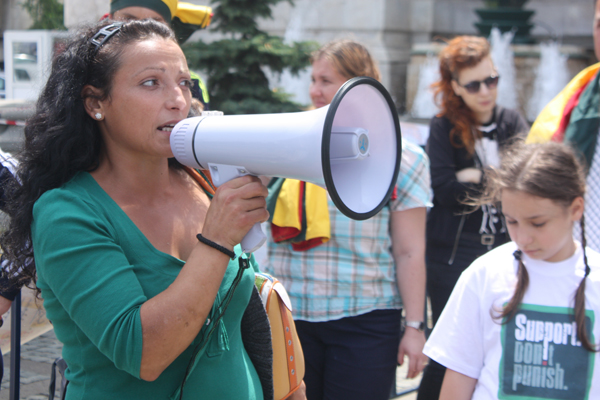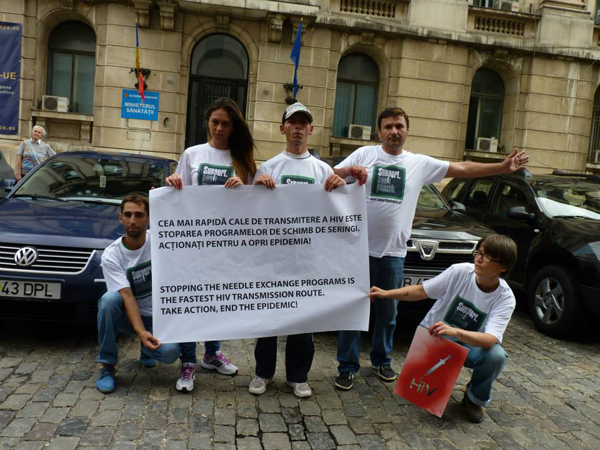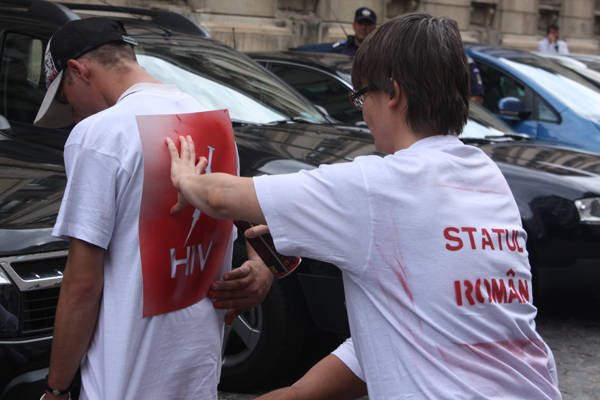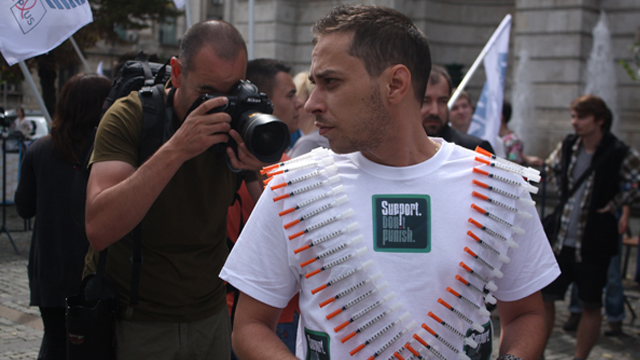Harm-reduction activists take to the streets of Bucharest to warn the authorities of alarming public health risks
While on treatment, I could give birth to a healthy baby and raise it properly for six years, stay away from trouble, get a job and be healthy up to now. I didn’t get any disease, thank God, with the help of this medication. If I stop the treatment now, I’ll end up on the streets again,” a woman said on the megaphone. For a former longtime heroin user, the thought of being deprived of the methadone pills and the medical and moral support she benefited from during the long years of efforts to get her life back on track didn’t presage a very bright future. On Monday morning, Bucharest’s Revolution Square, where more than two decades ago the mass movement that overthrew Romania’s communist dictatorship took shape, heard for the first time people chanting: “We want syringes! We want methadone!”
Trailer:
Watch the trailer of our movie on how the government’s neglect led to an HIV epidemic among drug injectors in Romania! CLICK HERE TO TAKE ACTION – sign a petition, send a letter!
The full film:
Outreach workers and other harm-reduction professionals, injecting drug users, and ordinary civilians who wanted to support their cause gathered here to let the authorities and public opinion know that ignoring this sector of public health services could lead to serious consequences. The international funding that was keeping needle exchange programs and opioid substitution treatment alive ran out at the end of June. This is happening at a time when almost one-third of Romania’s new HIV cases are being recorded among people who inject drugs, as compared to just one per cent at the end of 2007. This is an explosion largely triggered by changing patterns of consumption associated with the appearance and proliferation of new psychoactive substances (NPS) or ‘legal highs’. Whereas, between 2007 and 2010, fewer than 30 consumers were diagnosed with AIDS after sharing infected injecting paraphernalia, 2011 and 2012 saw more than 360 such new cases.


Three years ago, there were six NGOs providing needle exchange programs in the country. Today, there are only two left, and the biggest harm-reduction provider – the Romanian Association against AIDS, ARAS – is in danger of having to shut down its services, as the European structural funds which were largely financing its activities will no longer be available. This will mean 3,000 problematic drug users losing access to clean syringes, and 300 patients on opiate substitution therapy will have their treatment interrupted. The organization will only be eligible to apply for international funds again and keep running its programs, if Romania’s public health authorities are also willing to make a contribution.

“I am a former drug user. This month I’ve been clean for one and a half years. I was 17 years old when the ARAS team came to my neighborhood. It was the first time I felt there were people who cared. They gave me some packs of clean syringes. These people went where most of us wouldn’t even think of going,” said a young man quoted by totb.ro . He added that drug workers should be allowed to remain on the streets and policy makers should pay more attention to the specific needs of intravenous (IV) users. “The fastest way to spread HIV, is to cut down measures that have proven their efficiency,” Valentin Simionov of the Romanian Harm-Reduction Network (RHRN) also stated.
Three petitions were submitted to the health, internal affairs and labour ministers. Harm-reduction activists submitted the first of them, asking for funds to be allocated for the services. The second petition was to allow access to substitution treatment in the arrest centres operating under the General Inspectorate of the Romanian Police, and to contribute more resources for the National Anti-Drug Agency to be able to run prevention and risk-reduction programs. The third was aimed at raising awareness of the risks of stigmatisation and legal prosecution that drug users and sex workers face when contacting service-providers – obliged, under current regulations, to collect personal data and implicitly disclose the identities of beneficiaries.
One cynical reaction came yesterday from Eugen Nicolaescu, Romania’s public health minister, who declared that in his institution’s view, the problem is that IV users just weren’t keen on the needles and syringes his Ministry provides through the National Institute of Infectious Diseases “Prof. Dr. Matei Balş” which also hosts the main ARAS substitution treatment clinic. “The problem is that we’re expected to also pay for the distribution of these syringes until they reach someone or other. I’m sorry! Romania does not dispose of sufficient funds in its health budget to do so,” he told the national media.
ARAS representatives responded that the NGO receives no syringes from the Health Ministry or any other institution affiliated to it, and that they are not even aware of any specific public funds allocated to harm-reduction programs, as these are not publicised or specified as such in the official budget documents. They also confirmed that they did receive a batch of shooting equipment from the drugs agency of the Ministry of Internal Affairs, but stated that it was of such low quality that it caused users more medical complications – broken veins and abscesses – than benefits. What’s certain is that the cost of antiretroviral treatment for each patient whom health policy makers will have to support as HIV-infection rates go up, is at least 6,000 EUR per year, roughly twelve times higher than the cost of prevention for a drug user receiving clean syringes from harm-reduction workers. This way, in the not so very distant future, Romania’s health minister will have to explain that there are no funds for genuinely sick people, rather than for those whose health could have been protected.
Text and photos by Liviu Alexandrescu – Romanian Harm-Reduction Network




